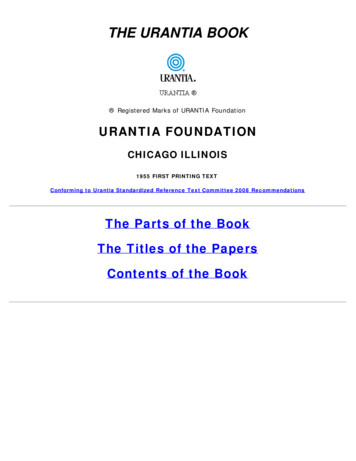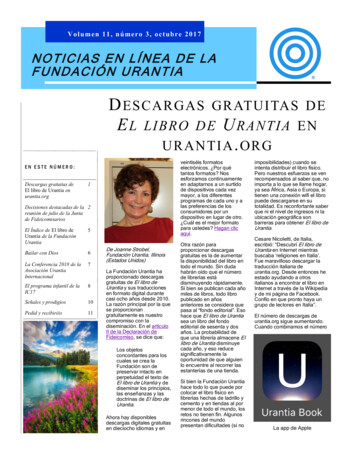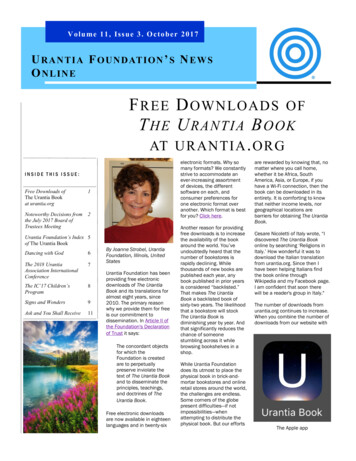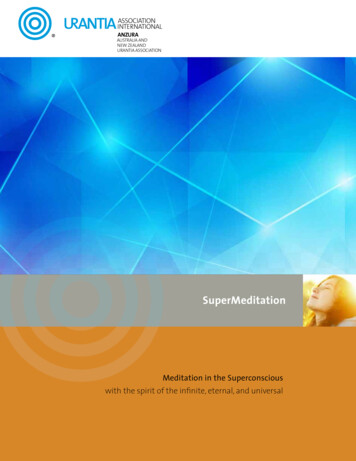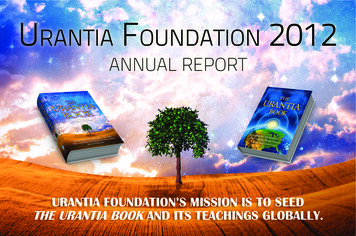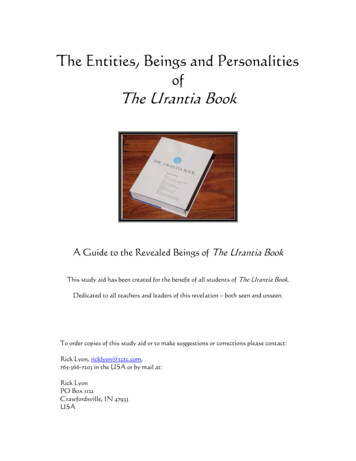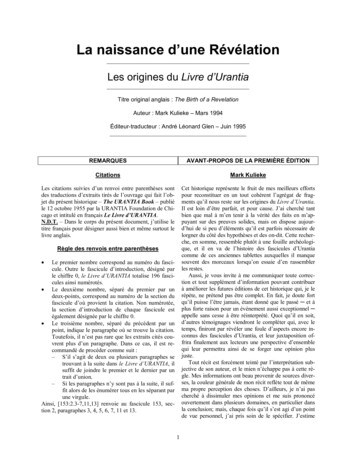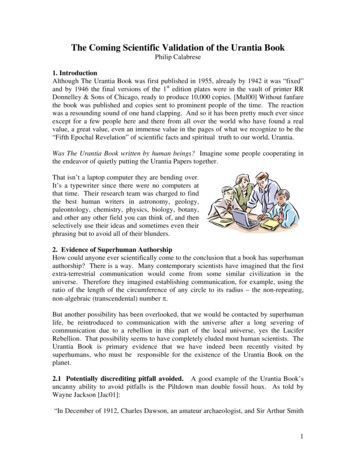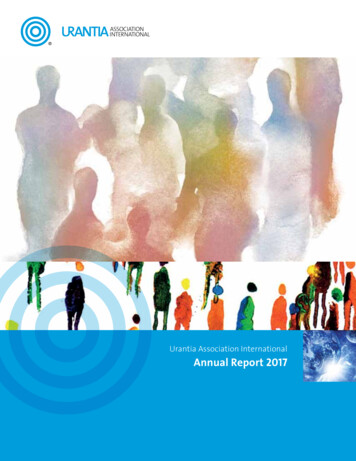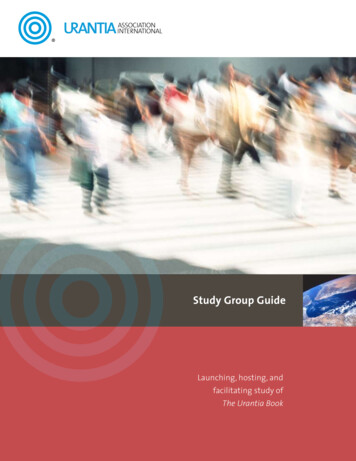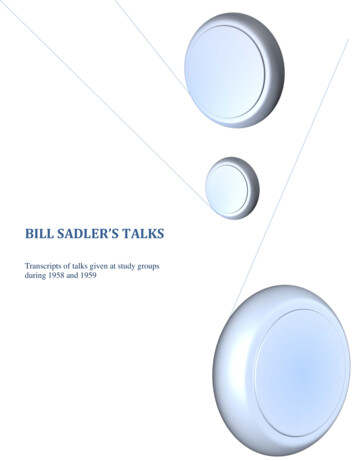
Transcription
BILL SADLER’S TALKSTranscripts of talks given at study groupsduring 1958 and 1959
BILL SADLER’S TALKSWilliam Sadler, Jr., better known as Bill, was a gifted student of The Urantia Book whoalso had a talent for distilling its most complex teachings into conversational language.Some of his informal talks were recorded and the following topical subjects weredeveloped from transcripts of such presentations to a study group sometime in 1958 or1959. He also authored A Study of the Master Universe and its Appendices. Thefollowing texts, as they were transcribed, may occasionally contain feedback from theaudience. While they may not be exhaustive of their original content, some Urantia Bookquotes or references to such have been added for deeper study purposes.Upon presenting this document, the Urantia Foundation wishes to express sincerethankfulness in regard to all whom, by near or afar, have contributed to its realization. Itis made available to all and is particularly intended to further stimulate the minds of allstudents of ‘The Urantia Book’ teachings.
Table of ContentsSome Comments on the ForewordQuestions and answers to Comments on the ForewordComments on the Nature of PersonalityDiscussion of the Absolutes, Part IDiscussion of the Absolutes, Part IIDiscussion of the Absolutes, Part IIIDiscussion of the Absolutes, Part IVHypothesis of the Master UniverseMindedness and Spirituality, Comments on the AbsolutesThe Journey following Mortal DeathWhat Will we Find in Outer Space?The Local Universe Mother Spirit in the Present Universe ageDestiny of the Master MicaelsSome Considerations Related to the Third Universe ageKnowing God as a Qualitative Personal ExperienceComments on Destiny ReservistsThe Growth of God the AbsolutePersonality, Choice and MindSome Comments on Paper 105, ''Deity and Reality''Brief Comment on the Rodan PapersCould Jesus have Avoided the Cross?How big is Paradise?Adventures in the Cosmos, Part IComments on Personal Growth, Stewardship and ServicePersonal Growth and Mansion World ArrivalSome Comments on Deity Functions in the Master UniverseSpreading the Urantia 76178182183187195214226234
Some Comments on theForeword to the Urantia BookThe Foreword discusses just five topics. It discusses number one, Deity, in threesections, one two, three. Second, it discusses reality. What is real? Again, in threesections, four, five, and six. It discusses, third, experiential Deity, in four sections, seven,eight, nine, and ten. Gosh, I can't count in these Roman numerals. Fourth, it discusses thethree absolutes, in section eleven. And fifth, the Trinities, in section twelve. And ofcourse you have the Acknowledgment. When you come right down to it, that isn't awhole lot of material. The catch is, it's rather complex. Deity, reality, experiential Deity–which is really a subdivision of the discussion of Deity, the three Absolutes–which is anextension of the discussion of reality, and the Trinities–which is a summation of thediscussion of Deity. Really, all they're talking about here is Deity and reality, in one formor another. Just two things.I want to tell you something. This is, in my life, a very historic occasion, and oneof very deep gratification because in my entire experience with this blue book, this is thefirst time any group of human beings has ever asked to have the Forward discussed. Ihave taught the Foreword under various stages of compression. I've used a kind ofintellectual alamite gun to force it down people. I've done a strip-tease with theForeword. I've made it ridiculously simple. And I've always had a captive audience. Butyou folks actually asked to talk about the Foreword. Well, all I can say is–in terms of theBible: "This hour has come." I'd like to do this, if I may. Would you let me try to giveyou a feeling for the Foreword first, and would you hold detailed questions until we'vejust taken an overview of the Foreword? I would like to try to communicate to you myfeeling for the intent which is behind the Foreword.The Foreword starts out with an apology. It says that our language isn't very good.And indeed, it isn't. It says we want to help you understand. You see, the secondarypurpose of the Urantia Book is the illumination of the human mind. It's primary purposeis the salvation of human souls. The book makes an intellectual appeal, because the bookis in English. Therefore, it's got to enter our consciousness through mind. The Forewordtips its hat in two paragraphs to the human desire to start from man and proceed to God.You'll recall in one of the papers where they first talk about Trinity Teacher Sons, theytell why they wrote the book the way they did, starting from God and proceeding outwardand downward to man.They point out that if you start from man and go to God, this might be acertain way of grasping facts, but the truth would elude you. You don't start withconsequences, you start with causes, you start with sources. So they start this booktalking about God–but there are two paragraphs here (that start on Page 1 at the bottom)in which very quickly they accede to the human yearning to start from the simple andproceed to the complex. In the last two paragraphs on Page 1, they very quickly start withour world and go right into Paradise. Then they add a few comments: "Your world,Urantia, is one of many similar inhabited planets which comprise the local universe ofNebadon. This universe, together with similar creations, makes up the superuniverse of2
Orvonton, from whose capital, Uversa, our commission hails. Orvonton is one of theseven evolutionary superuniverses of time and space which circle the never-beginning,never-ending creation of divine perfection–the central universe of Havona. At the heartof this eternal and central universe is the stationary Isle of Paradise, the geographiccenter of infinity and the dwelling place of the eternal God." [P. 1 - §5]Now, I submit that's quite a paragraph, isn't it? In just eight or nine lines of type,they start here and take you swiftly into the center of all things. This is their concession tothe human desire to start from the simple and go into the complex. I think it's verysignificant that the Foreword starts with a discussion of Deity and divinity. Deity theydefine as a word which is larger than the word God, because God means a personalaspect of Deity. Deity can be other than personal as well as personal. The first half ofSection 1 in the Foreword is nothing more nor less than a discussion of how Deityfunctions. They give us seven levels on which Deity functions. These levels vary fromthe quiet to the active. They encompass all of the known, comprehensible functions ofDeity: Deity can be very quiet. Deity can also plan, and that means that there is apotential, a plan which will be fulfilled, a plan that will be consummated. Deity can befraternal, as in the case of Father, Son, and Spirit. Deity creates and spreads itself outover creation. Deity engages in creativity in time as well as instantaneous creativity–because evolution is simply creativity in time.Evolution simply means that creatures go in partnership with Deity. When aSeraphim is created, she has nothing to say about her status. She simply is born as a fullgrown Seraphim. But human beings have everything to say about their status asFinaliters. The evolutionary process is no different from the creative process except theact of creation is slowed down, broken into many stages and steps, and the creature hasthe possibility of going into partnership with the Creator, of being a co-creator of himselfas he is to be. I think of the creative and the evolutionary aspects of Deity as the outgoingaspects of Deity. I think of the Supreme and the Ultimate aspects of Deity as theingathering of the consequences of creation and evolution. When all finite creativity–when all finite evolution is summed up–it consolidates in Supreme Deity.This is a concept that's quite new in The Urantia Book. It's quite foreign toorthodox Christian theology. This concept is not wholly foreign to Western philosophy.The concept of a finite God is encountered in Western philosophy. But usually, when youencounter that concept, it is to the exclusion of an Infinite God. Only in this book do Ifind the two concepts associated. In the evolutionary Supreme Being, the UniversalFather who inhabits eternity and pervades infinity is escaping from the terrible limitationof absoluteness. Through the Supreme Being, the Universal Father vicariously can havethe experience of having an origin, of having a time of growth, of knowing what it is tostruggle. How could an infinite God know struggle except through a finite expression ofthat infinite God? You see God's love–his purpose, his energies–broadside throughout thefinite level in creation and evolution. Then consider a bringing back together of all thosethings--and that is the Supreme function of Deity. In the same sense, on the superfinitelevels, we have the Ultimate function of Deity, because what the Supreme is to the finite,the Ultimate is to the superfinite, to the absonite. (Not absolute, but more than finite.)This section goes on to discuss briefly what is finite, what is absonite, what isabsolute. I think the simplest way of looking at it is to consider time and space. If we're in3
time and space, we're finite. Those beings who are above time and space, but understandtime and space–deal with it–are absonite. An absolute being is timeless and spaceless. Ican think of a practical illustration there. Jesus' personalized Thought Adjuster is atimeless being, a timeless entity. You'll recall that when the Master put the command ofall celestial forces into the keeping of his personalized Adjuster, this Adjuster warnedhim. He said, "Now, I'll make sure you don't move about the planet, I understand space,but I want to warn you, if you want to do something that merely means an abridgement oftime, I can't help you there, because I'm not conscious of time." This Thought Adjusterdoes not transcend time, this Thought Adjuster is timeless. Time has no meaning to theThought Adjuster.This section goes on to discuss divinity. It points out that there are many differentkinds of divinity, qualities of divinity, but that the one thing which is characteristic ofdivinity is that it is the cement that holds all the acts of Deity together. If something isrelated to Deity in any way, shape, or form, it manifests qualities of divinity. Elsewherein the papers the comprehensible elements of divinity are defined as truth, beauty,goodness. We are told that these are unified in living personalities as love, mercy,ministry. Elsewhere, we're told that God is love. We're told that mercy is love applied,and that ministry is mercy in action. An effort is made in the second half of this firstsection to open up our thinking in terms of the quality of divinity, and for the first timeyou encounter the permutation of three.There's seven different aspects of divinity portrayed here, and if you'll stop andconsider, this is the same pattern you encounter in the Seven Master Spirits. They pointout that divinity may be perfect, relative, or imperfect. Then they let these associate, andyou wind up with seven different possible combinations. I think if you think of three inrelation to seven, you'll find this pattern more than once:1.2.3.4.5.6.7.Perfect in all respects, imperfect in none.Perfect in some respects, relative in other respects, imperfect in nonePerfect, relative, and imperfect all in association.Absolute perfection in some respects, imperfection in all others.Relative perfection in all aspects, imperfect in none.Relative and imperfect in association, imperfection in all aspects.I would say in human beings, you have an association of the perfect and theimperfect.The Thought Adjuster would disclose perfection of divinity, and a human beingwould be a rather completely imperfect entity, wouldn't he? You would have Alpha andOmega associated in man. Having discussed Deity and divinity, this Foreword then goeson to talk about God. When we consider God, we are considering an aspect of Deity, thepersonal qualities of Deity. How can we best understand that Deity can be other thanpersonal? Well, the Universal Father is the Lord of gravity as well as the source of love.To use the word God loosely now, God has a different attitude toward the physicaluniverse as compared with his sons and daughters in time and space. God could hardlylove a spiral nebula, could he?A spiral nebula is not a person. God's laws of gravity, of motion, of mass wouldapply to the spiral nebula. God's attitude of love would characterize his relationship to4
man. When I think of Deity and I want to name the Deity of God, I use the term the FirstSource and Center. I do not worship the First Source and Center. I worship that facet ofthe First Source and Center which is turned toward me, and this is God–moreparticularly, the Universal Father. I cannot worship that which I cannot comprehend orlove. I cannot love the source of gravity. I can well love the Father of personality.Even God, though, has its aspects. God functions on more than one level. We arenot told how God functions in terms of absolute perfection, but we are told how hefunctions in terms of relative divinity expression. We're told that he functionsprepersonally, personally, and superpersonally. When he acts in these three relationships,he acts in a different way. Pre-personally, he fragments. He produces Father fragments.Our relationship to these Father fragments has to do with just one class of them. They'recalled Thought Adjusters. They live in us as potential partners for the eternal journey.When he creates, he produces Sons, even as Jesus. Then he functions superpersonally.This is beyond personality. The prepersonal would be before personality.The personal we understand. But then he also functions beyond personality. Herehe neither fragments nor creates, he eventuates. The best thinking I can offer you on theword eventuate is this: An eventuated being, to me, is a being whose existence isinherently a consequence of a plan. I can illustrate this very simply. The Universal Fatherdoes not create the brotherhood of creatures. He eventuates it, in a sense. Simply by beingthe Father of each creature, brotherhood is inherent in the relationship of all creatures. Ithink we're stretching the word eventuate, but it's a good illustration. God does not createuniversal brotherhood. Universal brotherhood eventuates out of the fact of God'suniversal Fatherhood. You cannot have one without the other. (Don't make that go on allfours!) The word God has more than one meaning in these papers. The word God is usedwith seven different meanings. We are familiar with the first three–God the Father, Godthe Son, and God the Spirit. We're not familiar with God the Supreme. This is theemerging Deity of the finite level of existence. This is evolutionary Deity. This is God intime, not God in eternity. This is God in space, not God in infinity.God the Supreme is not an infinite Deity. God the Supreme is a consequence of theacts of infinite Deity. God the Sevenfold is an association of Deity. Our encounter withGod the Sevenfold is in the bestowal of Jesus–a very real encounter! When Jesus said,"He who has seen me has seen the Father," he spoke as God and for God, and this is thetruest illustration that we can apprehend concerning the function of God the Sevenfold.God the Sevenfold is God anywhere in time and space. God in action, in the imperfect,evolutionary domains.To us, the only God that we can comprehend is in the human bestowal of Jesus,and this is God the Sevenfold in action. God reaching out from Paradise to fellowship anycreature at any level of existence– even mortal creatures at the lowest level of existence.What God the Supreme is to the finite level, God the Ultimate is to the superfinite, theabsonite, level–that level which is like the ham in a sandwich. If the lower piece of breadis finite, and the upper piece of bread is absolute and infinite, then the ham would beabsonite, transcendental, separating the finite from the absolute. God the Absolute wouldbe the final expression of Deity. God the Absolute would be the final experiential, orcomprehensible expression of the Father, as the Eternal Son is the existential expressionof the Father. Existential, meaning, "that which comes into being by the inherent acts of5
God." Experiential, meaning, "that which creatures have had a hand in, hence couldunderstand."If God the Absolute could ever, ever appear in fact and in completion, then throughGod the Absolute we might understand God the Father as infinite. This tells me that Godthe Absolute will never complete his growth, because we will never understand. TheFather is infinite. We'll merely grow in that understanding. The third section deals withthe First Source and Center. I'm intrigued with the fact that they speak of the First,Second, and Third Sources and Centers, but there are only two sections in these paperswhich use those captions. They discuss the First Source and Center, and then I believeover in Paper 8, they discuss the Third Source and Center. You see, God the Father andGod the Spirit are quite alike, and they're both quite different from God the Son. TheFather and the Spirit are personal, as is the Son, but they're also everything else besidesbeing personal. They have many other-than-personal characteristics. The Son is personaland only personal. That's why the Son can't fragment himself, as both the Father and theSpirit can.You can't fragment a personality, and the Son can find nothing in his Deity tofragment, because there's nothing in his Deity which is not personal. He is the full,personal expression of God. The Father and the Spirit are also personal, but they are alsomuch that is other than personal, hence they can fragment themselves. You have Fatherfragments, and you have Spirit fragments. Son fragments, you will recall, come from theCreator Sons, not from the Eternal Son. Son-fused mortals derive their spirit endowmentnot from the Eternal Son, but from the Creator Son of their local universe. In this thirdsection, we are for the first time introduced to the Seven Absolutes of Infinity. We're toldabout the relationship which the First Source and Center has to these seven Absolutes. Ithink the easiest way to think about these seven Absolutes is to think of them in terms ofmatter, mind, and spirit.The Second Source and Center is the source of spirit. The Third Source and Centeris the source of mind--not that there's not also spiritual ministry there. The ParadiseSource and Center, the Eternal Isle, is the source of all things material, and the controllerof all things material. The easiest way to think of these three Absolutes is as thereservoirs out of which the matter, the mind, and the spirit of the evolving present and theunexpressed future are coming. From the Unqualified Absolute come the evolvinguniverses. From the Deity Absolute come the spirit beings which are being created andwill be created. From the Universal Absolute perchance they draw upon for mind. I'm notso sure about the last one, but I'm pretty sure about the first two.But I think it's a good convenient way of looking at this. Example: When a LocalUniverse Mother Spirit creates Seraphim, they appear in–what is it?–unit formation, ahundred and some odd thousand of them? It's a large number of Seraphim. They don'tcome from nothing. They come from something. When a cloud appears in the sky, thatcloud does not come from nothing; that cloud was there in the form of invisible watervapor before a change in temperature made it visible. These Seraphim that were createdwere potential in the universe before the Creative Spirit, by her creative action,transformed them from a potential to an actual. The unborn of the next generation arepotential in the germ plasm of the present generation of living human beings. If theyweren't potential, they jolly well couldn't ever become actual could they? This sectionmakes an unqualified statement: There are seven Absolutes of infinity, but the First6
Source and Center is primal in relation to total reality. This is not polytheism we'restudying; this is monotheism.There's only one Infinite Being. Others share his infinity and his absoluteness, butnone takes precedence over the First Source and Center. God, the Universal Father, is thepersonality of the First Source and Center. Then they discuss how God is related to theuniverse, and we see that God is not directly related to the universe, except in one aspect:God is related to creation, to the universes, through his six associated Absolutes, exceptin one particular: He is the direct Father of every personality in existence. Allpersonalities derive that quality of being from the Universal Father, and they are linked tothe Father by the personality circuit. The other six Absolutes do not participate with theFather in this bestowal of personality, with one minor exception: The Infinite Spirit, theThird Source and Center, has the Father's proxy. He's the Father's attorney, in fact, and hecan act for the Father. But again, this is the delegation of creative power.This section goes on to talk about reality. They point out the maximum realitywhich we can understand is a finite God. Let's face it. We want God to have a beginning,don't we? A beginningless God is really beyond our comprehension. The only reason weaccept an unbeginning God is because it's ridiculous to have a beginning–because if hehas a beginning, who's his Father, who's his grandfather, who's his great-grandfather? Wehave the choice between an uncaused cause or an endless series. Do you see that? Andthe endless series of course is ridiculous. The Greeks tried it. Back of Zeus they hadCronus, and back of him they had someone else; but eventually, you give up, and yousimply start with the uncaused cause. This section goes on to point out that conceptuallywe need a beginning, and though there never was a beginning, they're going to give usone in concept.They warn us this is not a reality. To God, to Deity, prior to any self-distribution,they give the name the I AM. And, they say, this is a philosophic concept. This is not areality. The most helpful thing I can suggest to you to deal with this is this: We use thenumber zero in all of our mathematics, but you have never seen nothing, have you? Youcan see one of nothing, or one and a half, or two, but you've never seen a zero ofanything, have you? Yet, we think in terms of zero. It's a most convenient concept inmathematics. Zero is a valid concept, but zero is not a factual reality, only a concept ofreality. Are you with me?The term I AM is just as valuable a thinking tool as the term zero. But neither arefactual. Nevertheless, they qualify. They say, "Now, look. The I AM may be a theoreticalconcept and a philosophical concession, but the Infinite is not. The Universal Father isthe Infinite." I think of the term First Source and Center as this: When you get down tothe level of the Seven Absolutes, and you want to isolate out the Infinite, it is the FirstSource and Center. This is the Infinite as manifest on the level of the Seven Absolutes.Just as when you want to say, "What is the personality of the First Source and Center?"the answer is, "God." What name do we give to that personality, the Universal Father?That is the name of our choosing. How could he have a name?He's nameless. In shorthand here, they tell you how the I AM distributed himself.They simply tell you–and these are valid concepts, but these are not factual realities–theysimply say, I'm going to use the word God to describe pre-God, because it's a simplerway of telling the story. They simply say that God separated himself from total reality,and if he hadn't done that, there would have been no room in which anything could take7
place, because how could you squeeze something in where God filled all things? God, asit were, contracted himself–and he can do this because he has will–what he contractedhimself into is the essence of Deity, at the heart of which is will. What he left behind isthe essence of non-Deity, non-will.One of the greatest criticisms I ever read of the book of Genesis was written by aZoroastrian theologian about 250 A.D. It's in the Pehlevi texts. This Zoroastrian, incriticizing Genesis, says, "God was not alone, because when God commanded, Let therebe light,' in order for that command to have effect, there must also have been present anobeyer of commands." I borrow that term from the old Zoroastrian theologian. TheUnqualified Absolute is the "obeyer of commands." When Deity takes snuff, theUnqualified Absolute sneezes. Now, when God separates himself from that which is notDeity, he still links himself to that which is not Deity. This linkage is the function of theUniversal Absolute, the conjoiner of the Deity Absolute from the non-Deity Absolute.And I think three links linked together is an excellent symbol for that relationship.God still fills all Deity. I think of God as contracting within Deity, while at thesame time he expands to continue to fill all Deity. I think of God as separating himselffrom the Son, of conjoining himself with the Son, of constituting the Trinity, as a thingthat happens simultaneously. So that instead of one of these circles–you know, the threecircles–just being full of God, this circle is now a triconcentric circle. It is full of theTrinity. In so doing, God achieves companionship. He separates himself from absolutepersonality, and in so doing, he becomes the Father of the absolute person, who therebybecomes his Son. And if he can become Father of the absolute person, he can becomeFather of any person. He ceases to be the absolute person, but becomes the UniversalFather of the absolute person and of all other persons.At the same time that he does this–when he expresses himself absolutely as aperson–he expresses himself absolutely as a non-person, and this is the origin of the Isleof Paradise. Or, to anthropomorphize it, Paradise is the absolute machine which God builtfor the same reason that men build machines–to perform repetitive acts. The physicalgoverning of the physical universes is a repetitive act, and God devised a flawlessmachine to do this job for him. Why should he personally attend to it when a machine, anabsolute machine, can do the job? They tell us, in Section IV, that reality is not all spirit.These papers make some startling statements! They say, for example, that God is spirit,but Paradise is not. They point out that our direction Godward is spiritward, so that as weconsider matter, mind, and spirit, the spiritual is the more real to us because our growthtowards reality follows a spiritual route.This is truth. This is not, however, fact. Energy, physical energy, is just as real asspiritual energy, but it doesn't have as much meaning or as much value to human beings.They point out here that reality can be Deified or not Deified. This planet is hardlyDeified reality, is it? But Finaliters have partaken of divinity and are a creature part ofDeified reality. They go on to point out that things may be either actual or potential. Weare actual people. Children yet unborn are potential people, are they not? Of course, youcan have something in between. A good illustration of something that is neither actualnor potential: the brotherhood of man. Is it unreal? No. No, you can't say that. Is it real?Well, read any newspaper and you can determine that it's not really here, is it? It is abecoming reality, isn't it? It's in the grey area, the zone of becoming. Are human beingsreal? Yes and no. Until they've fused with their Thought Adjusters, they are not truly real8
in the universe, are they? We're simply becoming citizens of the universe. Is a child anadult? Well, no. And yet he's not not an adult, is he? He's a becoming adult, isn't he? Orhave you coped with teenagers?This section closes with a discussion of not spirit reality. It discusses the Isle ofParadise, where they point out that Paradise is an absolute reality derived from Deity, butit is not Deity. I think the best way of looking at Paradise is: it is the absolute machinewhich God built. We can understand that, because we build machines to do jobs.Somewhere in here–it's not in this particular context–it says Paradise is not conscious asman could ever understand the meaning of such a term. Paradise, in some way, is aknowing reality. Paradise is not mindless, but it does not have mind as we could everunderstand the meaning of that word.You should think of Paradise in two ways:1. Paradise is a place, the dwelling place of God at the center of all things. It is ourfinal destination in our quest for God. On Paradise, we will find God, and–figuratively speaking–we shall stand before him, face to face.2. Paradise also has a function in the universe. As the Son draws all things spiritual,as the Third Person draws all things intellectual, so Paradise draws all thingsmaterial. Paradise is the central governing power of the material universe ofuniverses.Section 5 talks about personality reality, and it points out that personality comesfrom God, and that all reality that is linked with personality is associable. Prepersonalfragments, superpersonal beings are all contactable and associable with personality andpersonal beings. This is a part of Deity reality in contrast to the not personal which cannever be associated with the personal. Man has no fellowship with a rock, but man canhave fellowship with an Adjuster, a Seraphim, or a Transcendentaler–given enough timeto have contact with Transcendentalers. (They would be super personal beings). Theysum up, at the end of this section, the functioning entity of a human being: body, mind,spirit, and soul.The body, our life mechanism. The mind which we
William Sadler, Jr., better known as Bill, was a gifted student of The Urantia Book who also had atalent for distilling its most complex teachings into conversational language. Some of his informal talks were recorded and following topical subjects were the developed from transcripts of such
